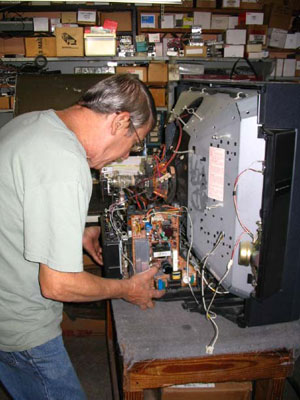Electronics Serviceperson
Tasks & duties

Electronics service people may do some or all of the following:
-
discuss problems or installation with clients
-
carry out tests to check for faults
-
repair or replace faulty parts
-
liaise with the manufacturers
-
clean equipment
-
reassemble and test equipment
-
record the servicing time and the replacement parts used
-
set up and maintain new equipment
-
run their own business
Specialisations
Electronics service people may specialise in marine and industrial electronic equipment.
Skills & knowledge
Electronics service people need to have:
-
knowledge of electronic equipment and how it works
-
knowledge of electronic circuits and the ability to read circuit diagrams
-
knowledge of electrical theory
-
practical skills to install, test and repair electronic equipment
-
problem-solving skills
-
communication skills
-
computer skills
Entry requirements
To become an electronics serviceperson you need to complete an apprenticeship and gain a National Certificate in Electronics Technology and/or a National Certificate in Electronic Engineering or a National Diploma in Electrotechnology. For further information contact the ETITO. Electronics serviceperson apprenticeships are part of the Modern Apprenticeship scheme, which are for people aged 16 to 21. For further information go to the Modern Apprenticeships website. During your apprenticeship training, you are supervised by an experienced electronics serviceperson and learn to service a variety of appliances.
Secondary education
School Certificate or NCEA Level 1 English, maths, science and physics is recommended to enter this job. Although many employers prefer you to have NCEA Level 2. Some schools offer electronics and the opportunity to complete units towards the National Certificate in Electronics Technology.
Registration
To operate without supervision, you must gain Electrical Service Technician (EST) registration with the Electrical Workers' Registration Board (EWRB). A practising licence issued by EWRB must be renewed annually.
EST registration can be gained as part of training towards a national certificate or by completing electrical theory and practical training, passing an examination and having on-the-job experience.
Useful experience
Experience working in electrical or electronics businesses, or as an electrician is useful.
Related courses
Electrical Engineering
Electronic Engineering
Electronic Equipment Servicing
For more information, please refer to Career Services.
Document Actions
